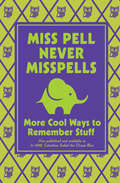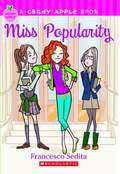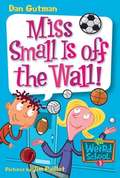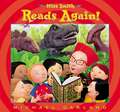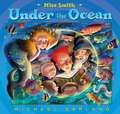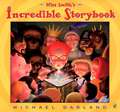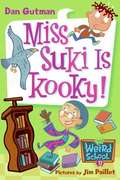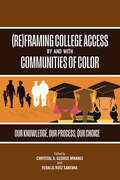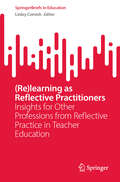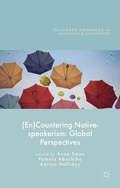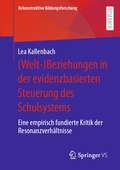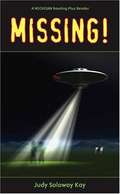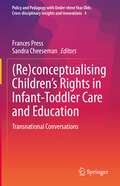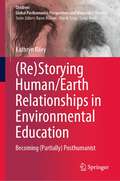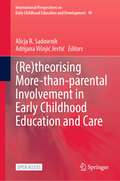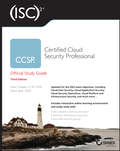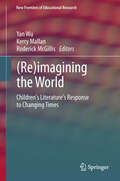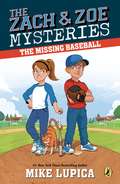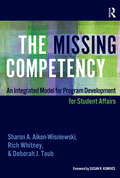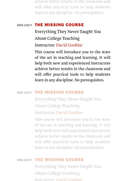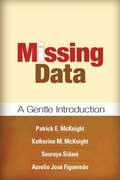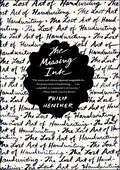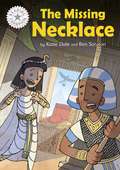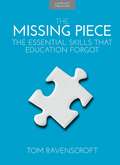- Table View
- List View
Miss Pell Never Misspells: More Cool Ways To Remember Stuff
by Steve Martin Martin RemphryFollow up book to the extremely successful 30 DAYS HAS SEPTEMBER: COOL WAYS TO REMEMBER STUFF. More cool ways to remember stuff! From acronyms to rhyming lists, this book makes remembering facts a breeze. Full of spelling, punctuation, and grammar memory tips, ways to improve vocabulary, geography hints, and much more!
Miss Popularity (Candy Apple Book #3)
by Francesco SeditaMeet Cassie Knight. Bubbly, stylish, and super-friendly, she's the fashion queen at her Texas school. But when her father's job moves the family to cold, snowy Maine, Cassie's in for a huge culture shock.
Miss Small Is off the Wall! (My Weird School #5)
by Dan Gutman Jim Paillot<P>Miss Small, the gym teacher, is teaching A.J., Andrea, and the gang to juggle scarves, balance feathers, and do the Chicken Dance! Is this any way to stay in shape? Whatever happened to good old dodgeball? <P>In fact, all the grown-ups at A.J.'s school seem to have something wrong with them. What's going on here? What are A.J. and the kids in his class going to do? They've got to convince Miss Small to act her age before the end of the year! <P>Never before has school been this mixed up -- or this much fun. Popular author Dan Gutman pulls out all the stops for this right-on second-grade hilarity. Be sure to read all the zany stories in this series: Miss Daisy is Crazy!, Mr. Klutz in Nuts!, Mrs. Roopy is Loopy!, and Ms. Hannah is Bananas!
Miss Smith Reads Again!
by Michael GarlandZack can&’t wait for school with Miss Smith—her incredible storybook promises a new expedition each time she reads.This time the class is off on a fantastic journey to a Lost World. Zack and his friends are having a wonderful time—until a Tyrannosaurus appears out of the jungle! The kids all flee to safety. But where is their beloved teacher? And where is the magic book that can take them home? Young readers will be thrilled to join Miss Smith&’s escapade among the dinosaurs, brought to vivid life in Michael Garland&’s trademark eye-popping, look-again art.
Miss Smith Under the Ocean
by Michael GarlandMiss Smith's class can't wait for story time. When their teacher reads from her incredible storybook, the worlds she describes come alive-literally! So when the class takes a field trip to the local aquarium, reading magic brings favorite nautical characters to life, including Long John Silver and the Swiss Family Robinson. From swimming with the Little Mermaid to rescuing their treasured storybook from scurvy pirates, it's another rollicking reading adventure Miss Smith's class - and readers - won't soon forget.
Miss Smith's Incredible Storybook
by Michael GarlandWhen Zack meets his second-grade teacher, Miss Smith, he can tell right away that her class will be different. But he has no idea just how different it will be! Miss Smith has a knack for telling tales when she reads from her incredible book, the stories literally spring to life! Then one day Miss Smith is late for school. The principal takes over and things get out of hand. The classroom is swarming with storybook characters from princesses to pirates to the three little pigs? All it takes is one spectacular teacher.
Miss Suki Is Kooky! (My Weird School #17)
by Dan Gutman Jim PaillotMiss Suki is a famous children's book author-and she's coming to A.J.'s school! She lives in the rainforest and writes about endangered animals. But when her pet raptor gets loose in the classroom, it's the kids who are going to be endangered! Yikes!
**Missing**: Our Knowledge, Our Process, Our Choice (SUNY series, Critical Race Studies in Education)
by Chrystal A. George Mwangi; Yedalis Ruíz SantanaOffers novel frameworks and models for understanding college access and choice among communities of Color.This much-needed volume brings together academics, practitioners, students, and community members of Color to thoroughly reframe college access and choice in research and practice. Enrollment rates continue to differ substantially by race and ethnicity. While Black, Indigenous, and other People of Color remain inequitably stratified in the pursuit of higher education, many models of college choice are simply insufficient for understanding the college-going processes of diverse students. Continually centering BIPOC knowledge, assets, and needs, contributors provide a series of varied yet connected frameworks grounded in culturally sustaining, community-oriented research. Like the educational journeys it represents, the volume is a communal activity that invites participation. Each chapter concludes with a series of critical reflection questions to guide readers in deeper learning and engagement.
**Missing**: Insights for Other Professions from Reflective Practice in Teacher Education (SpringerBriefs in Education)
by Linley CornishThis book examines significant developments in reflective practice, delving into research conducted with novice teachers. It fills a gap in existing literature by examining the 'how' of reflective practice. How do professionals learn reflective practice, fostering relearning? How do they guide students, mentees, and novices in adopting reflective practices? Stemming from teacher education, the focus is extended beyond this field, emphasizing the relevance of these strategies across professions. It is divided into three parts – thinking about reflection; learning to reflect; and becoming a reflective practitioner. It offers fresh perspectives on conceptualizing reflective practice and suggests practical strategies for integrating it into pre-service coursework, assessment, training, and development. Intended for academics, practitioners, and educators across disciplines, this book serves as a comprehensive guide for anyone committed to fostering reflective practice within their professional sphere.
**Missing**: Global Perspectives (Palgrave Advances in Language and Linguistics)
by Adrian Holliday Anne Swan Pamela AboshihaThe book addresses the issue of native-speakerism, an ideology based on the assumption that 'native speakers' of English have a special claim to the language itself, through critical qualitative studies of the lived experiences of practising teachers and students in a range of scenarios.
**Missing**: Eine empirisch fundierte Kritik der Resonanzverhältnisse (Rekonstruktive Bildungsforschung #38)
by Lea KallenbachAusgehend von erheblichen und anhaltenden Wirksamkeitsdefiziten nimmt Lea Kallenbach in der vorliegenden Arbeit eine Perspektiverweiterung auf die evidenzbasierte Steuerung des Schulsystems vor. Dies erfolgt in zweifacher Weise: theoretisch auf der Grundlage der Weltbeziehungssoziologie (Rosa 2016) und empirisch über die Entwicklung und Anwendung eines rekonstruktiven Zugangs. Hierdurch eröffnen sich neue Interpretationswege, die das Nicht-Gelingen evidenzbasierter Steuerung als Schnittstellenproblematik zwischen einzelnen Ebenen des Schulsystems verstehen.
Missing!
by Judith KayWhen high school students in the small midwestern town of Oakton start disappearing, police are left without any clues until a psychic named Serena Sills begins working on the case. Serena and Police Chief Matt Williams combine detective work and supernatural intuition as they try to find the missing teenagers before it's too late. The MICHIGAN Reading Plus Readers are original fiction written for students who wish to improve their reading skills. The MICHIGAN Reading Plus Readers support the need for extensive reading on topics of interest to today's students. The Readers offer students books in the genres of mystery, science-fiction, and romance. Activities that practice vocabulary and reading skills are provided on the companion website.
**Missing**: Transnational Conversations (Policy and Pedagogy with Under-three Year Olds: Cross-disciplinary Insights and Innovations #4)
by Frances Press Sandra CheesemanThis book brings together researchers from a variety of national contexts to examine and explore the conceptualisation, reconceptualisation and translation of children’s rights for infants and toddlers in early childhood education and care settings.It brings together authors from various national contexts to examine changing understandings and manifestations of infant and toddler rights in Early Childhood Education and Care. The book aims to engender trans-national dialogue through the contributions. Through such dialogue, both authors and readers are challenged to recognise the specificity of their own cultural contexts and thereby envision a more expansive view of infant and toddler rights. By drawing together reflections on infant-toddler rights from key early childhood researchers across the world, this book will extend readers understandings of rights – not only in terms of how rights are (re)conceptualised but also how to meaningfully translate the rights afforded in policy to practice.
**Missing**: Becoming (Partially) Posthumanist (Children: Global Posthumanist Perspectives and Materialist Theories)
by Kathryn RileyThis book is situated in the simultaneous thinking (theory) and doing (action) of posthumanist performativity and new materialist methodologies to bring forth a multitude of stories that demonstrate co-constituted and co-implicated worldmaking practices.It is written in response to the fact that our Earth is at a critical juncture. As atmospheric temperatures rise and cast unprecedented and wide-spread social and ecological crises across the planet, social and ecological injustices and threats cannot be separated from globalising, neoliberal, capitalist, and colonial discourses that proliferate through anthropocentric and humancentric logics. Manifesting in binary classifications that position the human as separate from the Earth, and dominant categories of the human in hierarchies of power, such logics homogenise and institutionalise the field of environmental education and result in an over-emphasis on instrumentalist, technicist, and mechanistic teaching and learning practices.Exploring the affects emerging within, and between, an assemblage comprising Researcher/Teacher/Environmental Education Worldings, this book seeks to understand how the researcher makes sense of herself with/in the broader ecologies of the world; collaborative processes with an elementary-school teacher in Saskatchewan, Canada, as actualised through four co-created and co-implemented multisensory researcher/teacher enactments (Mindful Walking, Mapping Worlds, Eco-art Installation, and Photographic Encounters); and how the researcher/teacher organises themselves with Land-based pedagogies, environmental education curriculum policy, and wider discourses of Western education. This book does not propose a better way of teaching and learning in environmental education. Rather, showing how difference between categories is relationally bound, this book offers a conceptual (re)storying of human/Earth relationships in environmental education for social and ecological justice in these times of the Anthropocene.
**Missing** (International Perspectives on Early Childhood Education and Development #40)
by Alicja R. Sadownik Adrijana Višnjić JevtićThis open access book provides a critical, thought-provoking, and stimulating overview of theories applied worldwide to conceptualise collaborations between early childhood education and children's families. The book starts with a critical reflection on the colonial undertones of parental involvement (PI) and acknowledges a strong political will to improve this aspect of early childhood education and care. The chapters in the book describe and discuss various theories, including the cultural historical wholeness approach, Bronfenbrenner's ecology of human development, the theory of social capital, the theory of collaboration, family-school partnership models proposed by Epstein and Hornby, Bourdieu's social theory, the theory of practice architectures, the discourse/narrative theory, and posthumanism. By proposing the concept of more-than-parents, the authors aim to embrace both the diversity of intergenerational family configurations and the agency of materiality, artifacts, and the involvement of more-than-human actors.
**Missing** (Sybex Study Guide)
by David Seidl Mike ChappleThe only official study guide for the new CCSP exam objectives effective from 2022-2025 (ISC)2 CCSP Certified Cloud Security Professional Official Study Guide, 3rd Edition is your ultimate resource for the CCSP exam. As the only official study guide reviewed and endorsed by (ISC)2, this guide helps you prepare faster and smarter with the Sybex study tools that include pre-test assessments that show you what you know, and areas you need further review. In this completely rewritten 3rd Edition, experienced cloud security professionals Mike Chapple and David Seidl use their extensive training and hands on skills to help you prepare for the CCSP exam. Objective maps, exercises, and chapter review questions help you gauge your progress along the way, and the Sybex interactive online learning environment includes access to a PDF glossary, hundreds of flashcards, and two complete practice exams. Covering all CCSP domains, this book walks you through Cloud Concepts, Architecture and Design, Cloud Data Security, Cloud Platform and Infrastructure Security, Cloud Application Security, Cloud Security Operations, and Legal, Risk, and Compliance with real-world scenarios to help you apply your skills along the way. The CCSP credential from (ISC)2 and the Cloud Security Alliance is designed to show employers that you have what it takes to keep their organization safe in the cloud. Learn the skills you need to be confident on exam day and beyond. Review 100% of all CCSP exam objectives Practice applying essential concepts and skills Access the industry-leading online study tool set Test your knowledge with bonus practice exams and moreAs organizations become increasingly reliant on cloud-based IT, the threat to data security looms larger. Employers are seeking qualified professionals with a proven cloud security skillset, and the CCSP credential brings your resume to the top of the pile. (ISC)2 CCSP Certified Cloud Security Professional Official Study Guide gives you the tools and information you need to earn that certification and apply your skills in a real-world setting.
**Missing**: Children's literature's response to changing times (New Frontiers of Educational Research)
by Yan Wu Kerry Mallan Roderick Mcgillis(Re)Imagining the world: Children's Literature's Response to Changing Times considers how writers of fiction for children imagine 'the world', not one universal world, but different worlds: imaginary, strange, familiar, even monstrous worlds. The chapters in this collection discuss how fiction for children engages with some of the changes brought about by new technologies, information literacy, consumerism, migration, politics, different family structures, cosmopolitanism, new and old monsters. They also invite us to think about how memory shapes our understanding of the past, and how fiction engages our emotions, our capacity to empathise, and our desire to discover, and what the future may hold. The contributors bring different perspectives from education, postcolonial studies, literary criticism, cultural studies, childhood studies, postmodernism, and the social sciences. With a wide coverage of texts from different countries, and scholarly and lively discussions, this collection is itself a testament to the power of the human imagination and the significance of children's literature in the education of young people.
The Missing Baseball (Zach and Zoe Mysteries, The #1)
by Mike LupicaPerfect for fans of Cam Jansen, #1 New York Times bestseller Mike Lupica begins an exciting new chapter-book series, featuring his trademark sports action and heart, and a lovable twin brother-sister duo who solve sports-related mysteries.There's nothing eight-year-old twins Zach and Zoe Walker love more than playing sports and solving mysteries. And when those two worlds collide . . . well, it doesn't get any better than that. So when a baseball signed by Zach's favorite major league player suddenly goes missing--the search is on! Luckily, amateur sleuths Zach and Zoe are on the case. Can they solve the mystery and find the ball before it's lost for good?In this first book of the Zach and Zoe Mysteries, bestselling author Mike Lupica begins a series for a new and younger audience, introducing readers to a sports-loving detective duo who can swing for the fences and catch the culprit in one fell swoop. With a recipe equal parts sports and mystery, the Zach and Zoe Mysteries break fresh ground for an author who has been called the greatest sportswriter for kids.
The Missing Competency: An Integrated Model for Program Development for Student Affairs
by Sharon A. Aiken-Wisniewski Deborah J. Taub Rich Whitney“Authors Sharon Aiken-Wisniewski, Rich Whitney, and Deborah Taub have done a great service to student affairs and to student learning and development with this fine book, The Missing Competency: A Program Development Model for Student Affairs. The profession owes them great appreciation for returning the foundational competency of programming to our collective attention and providing a contemporary model to implement programs of quality.”—From the foreword by Susan R. KomivesProgram development is central to the work of student affairs professionals, yet the field has not prioritized the development of competency in this area. This theory-to-practice, sequential guide to program development fills that gap in the literature. The authors describe the elements of program planning and delivery from the inception of the idea through the use of assessment to revise and improve the program for the future.Whether a new professional or a seasoned leader, this volume offers the reader a deeper understanding of program development. Starting with a foundational understanding of this process, the book proceeds to a step-by-step process, taking a program from an idea to a proposal with goals, objectives, budget, and timeline with tasks, and beyond planning to implementation. The book concludes with stressing the importance of assessment as the program continues to develop over time. Each chapter applies program development concepts through program examples. Finally, the authors leave readers with tools and templates to support the process.
The Missing Course: Everything They Never Taught You about College Teaching
by David GooblarA generation of research has provided a new understanding of how the brain works and how students learn. David Gooblar offers scholars at all levels a practical guide to the state of the art in teaching and learning. His insights about active learning and the student-centered classroom will be valuable to instructors in any discipline, right away.
Missing Data
by Patrick Mcknight Katherine McknightWhile most books on missing data focus on applying sophisticated statistical techniques to deal with the problem after it has occurred, this volume provides a methodology for the control and prevention of missing data. In clear, nontechnical language, the authors help the reader understand the different types of missing data and their implications for the reliability, validity, and generalizability of a study's conclusions. They provide practical recommendations for designing studies that decrease the likelihood of missing data, and for addressing this important issue when reporting study results. When statistical remedies are needed--such as deletion procedures, augmentation methods, and single imputation and multiple imputation procedures--the book also explains how to make sound decisions about their use. Patrick E. McKnight's website offers a periodically updated annotated bibliography on missing data and links to other Web resources that address missing data.
The Missing Ink: The Lost Art of Handwriting
by Philip HensherWhen Philip Hensher realized that he didn't know what a close friend's handwriting looked like ("bold or crabbed, sloping or upright, italic or rounded, elegant or slapdash"), he felt that something essential was missing from their friendship. It dawned on him that having abandoned pen and paper for keyboards, we have lost one of the ways by which we come to recognize and know another person. People have written by hand for thousands of years— how, Hensher wondered, have they learned this skill, and what part has it played in their lives? The Missing Ink tells the story of this endangered art. Hensher introduces us to the nineteenth-century handwriting evangelists who traveled across America to convert the masses to the moral worth of copperplate script; he examines the role handwriting plays in the novels of Charles Dickens; he investigates the claims made by the practitioners of graphology that penmanship can reveal personality.But this is also a celebration of the physical act of writing: the treasured fountain pens, chewable ballpoints, and personal embellishments that we stand to lose. Hensher pays tribute to the warmth and personality of the handwritten love note, postcards sent home, and daily diary entries. With the teaching of handwriting now required in only five states and many expert typists barely able to hold a pen, the future of handwriting is in jeopardy. Or is it? Hugely entertaining, witty, and thought-provoking, The Missing Ink will inspire readers to pick up a pen and write.
The Missing Necklace: Independent Reading White 10 (Reading Champion #201)
by Katie DaleA crime has been committed in Ancient Egypt - who has stolen the Queen's precious necklace? Reading Champion offers independent reading books for children to practise and reinforce their developing reading skills.Fantastic, original stories are accompanied by engaging artwork and a reading activity. Each book has been carefully graded so that it can be matched to a child's reading ability, encouraging reading for pleasure.
The Missing Piece: The Essential Skills That Education Forgot
by Tom RavenscroftThere is a fundamental gap in education. While we focus on building knowledge and securing good grades there is something missing. All of us, whatever we do, need a core set of skills which go beyond the academic - to work with others, to manage ourselves, to communicate effectively, and to creatively solve problems. We might call them different things but we draw on them as much as numeracy or literacy. Tom Ravenscroft knows them as the enterprise skills. If we need them, our students need them even more. They underpin effective learning in the classroom. They stop students dropping out at university. They are more highly valued than academic grades by employers. They are a foundation for successful entrepreneurship. They are the enablers of civic engagement and social mobility. When we look to the next decades, in a world of increased automation, fragmented jobs and the need for constant learning it is these skills that will really set our children and young people up for future success. Yet as an education system, we behave as if they cannot or should not be taught. But they can be, and they must be. Tom Ravenscroft has writen this book almost a decade after he set up Enabling Enterprise as a social enterprise. He was a secondary school teacher and the Enabling Enterprise programme was for the students in his inner-city classroom. They were not learning enough in school, and were in no sense set up for the rest of their lives. Over the last ten years, he has had the enormous privilege of leading a growing team of teachers and has worked with hundreds of classroom teachers, thousands of employer volunteers and over 200,000 students. He has seen these students build those skills with the same rigour and focus as any other academic learning. And he has seen that when they are mastered, we truly allow our students to achieve their potential.
The Missing Piece: The Essential Skills That Education Forgot
by Tom RavenscroftThere is a fundamental gap in education. While we focus on building knowledge and securing good grades there is something missing. All of us, whatever we do, need a core set of skills which go beyond the academic - to work with others, to manage ourselves, to communicate effectively, and to creatively solve problems. We might call them different things but we draw on them as much as numeracy or literacy. Tom Ravenscroft knows them as the enterprise skills. If we need them, our students need them even more. They underpin effective learning in the classroom. They stop students dropping out at university. They are more highly valued than academic grades by employers. They are a foundation for successful entrepreneurship. They are the enablers of civic engagement and social mobility. When we look to the next decades, in a world of increased automation, fragmented jobs and the need for constant learning it is these skills that will really set our children and young people up for future success. Yet as an education system, we behave as if they cannot or should not be taught. But they can be, and they must be. Tom Ravenscroft has writen this book almost a decade after he set up Enabling Enterprise as a social enterprise. He was a secondary school teacher and the Enabling Enterprise programme was for the students in his inner-city classroom. They were not learning enough in school, and were in no sense set up for the rest of their lives. Over the last ten years, he has had the enormous privilege of leading a growing team of teachers and has worked with hundreds of classroom teachers, thousands of employer volunteers and over 200,000 students. He has seen these students build those skills with the same rigour and focus as any other academic learning. And he has seen that when they are mastered, we truly allow our students to achieve their potential.
